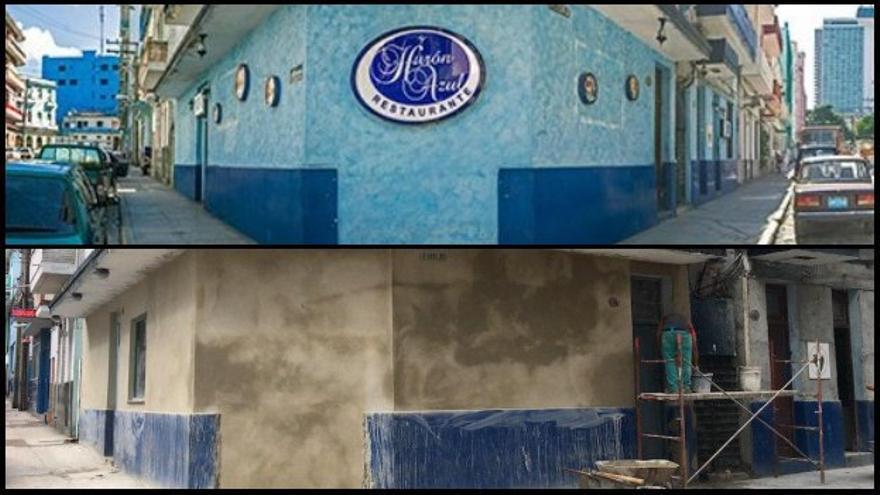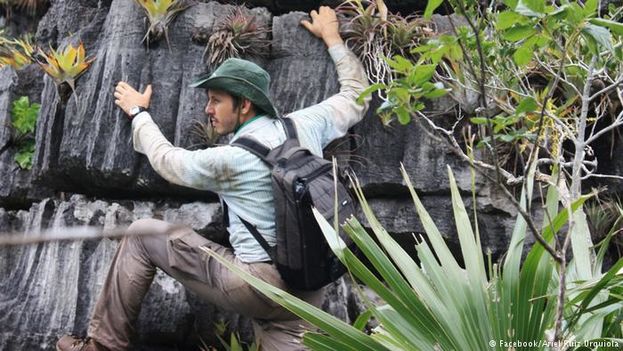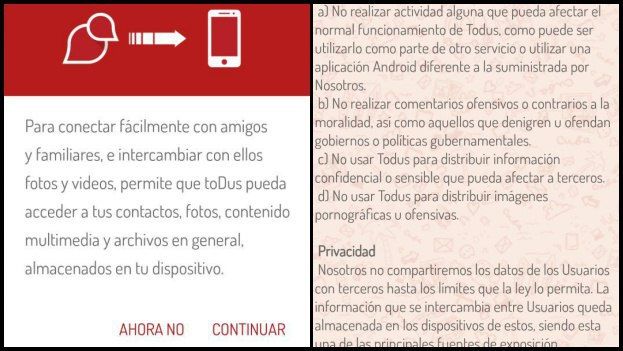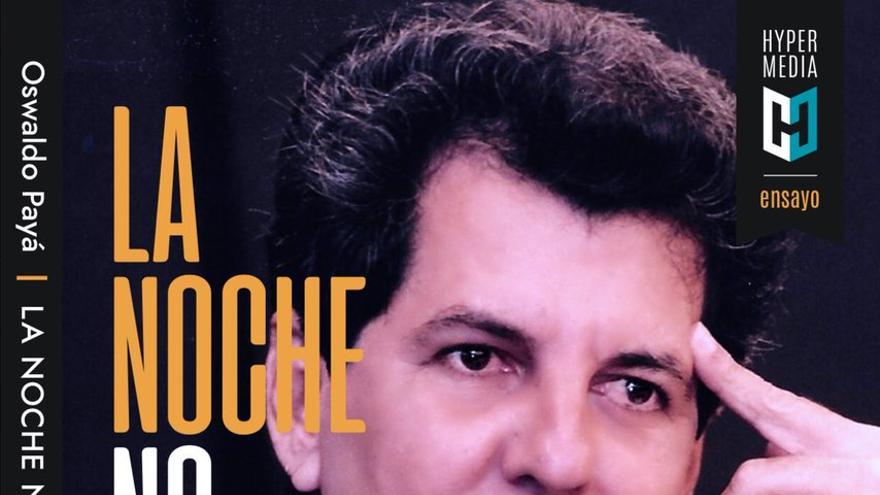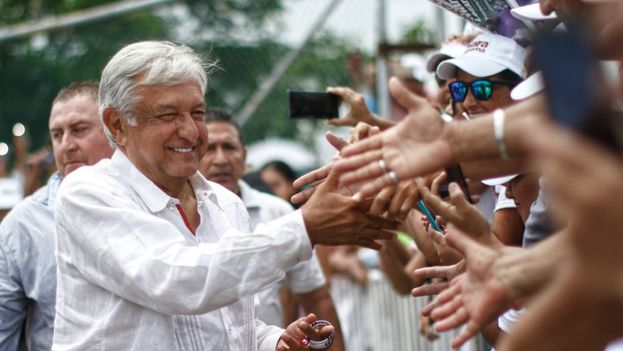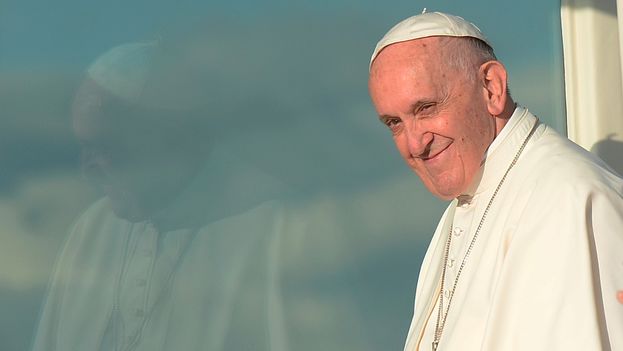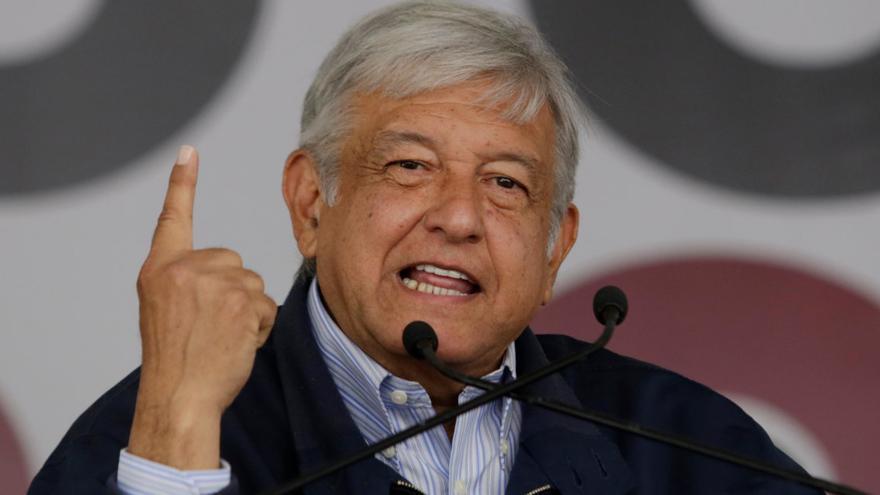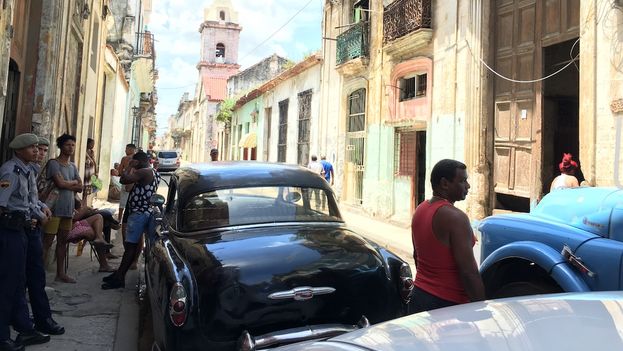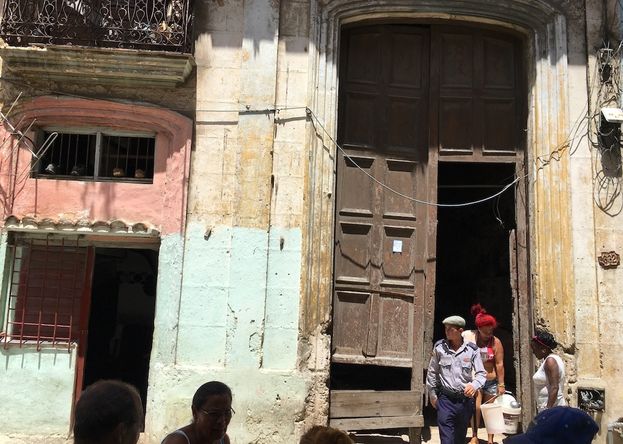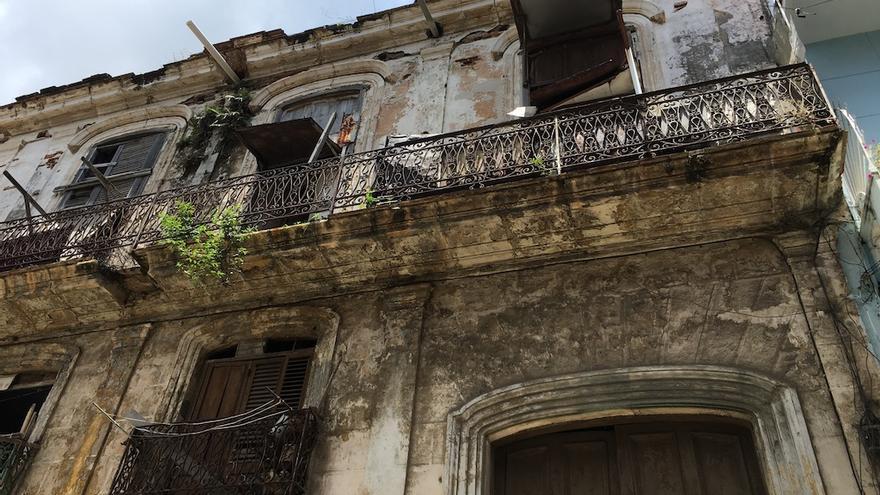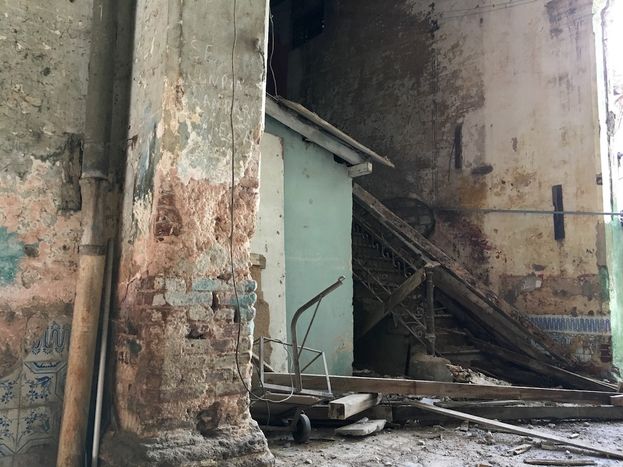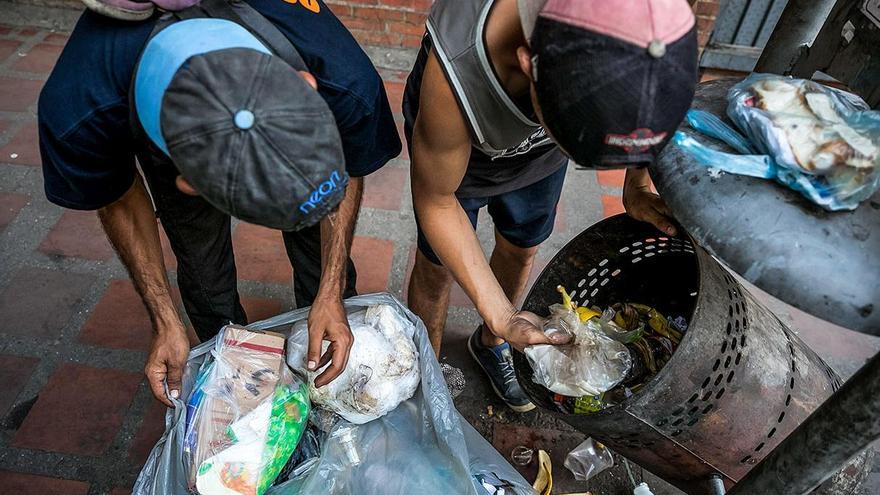Aurimar has three children, the youngest five months, but she is surrounded by more children. “They are my nieces and nephews. I bring ten in all, because they have nothing to eat, either,” she explains.
The young woman lives in a house in a popular part of San Bernardino with her partner, a security guard who earns the Venezuelan minimum wage set at 2,555,500 bolivars (a dollar a month on the black market exchange rate). A kilo of meat is worth between four and five million bolivars. continue reading
The box from the Local Production and Supply Committees (CLAP) helps the family a lot in feeding their kids, but it is not enough. “It comes once a month and doesn’t last,” laments Aurimar.
The box which the Government sells through a network associated with the United Socialist Party of Venezuela (PSUV) may contain rice, lentils, beans, powdered milk, oil, corn flour and pasta. Most of the products are from Mexico and of questionable quality. A newspaper investigation revealed the low quality of the powdered milk which also has a high sodium content and low protein, which can cause health problems for consumers.
Other works by journalists and the National Assembly have denounced a framework of corruption around CLAP, and the former attorney general of the Republic, Luisa Ortega Diaz, has accused Nicolas Maduro’s presumed front men of being involved in the bad management of that assistance program.
In order to get the CLAP box, one must have the Heritage ID, an instrument of political and social control that was widely used in the presidential election of last May 20.
Aurimar says that in her home they rarely taste animal protein, “that’s why we appreciate the attention they give us in the Church,” she comments.
Father Numa Rivero is a native of Puerto Cumarebo, in the state of Falcon, and was assigned as parish priest of San Bernardino in January 2017. “One day I was in the office, I heard noises and was startled to see what was happening. There were people eating from the trash. It really moved me because I had never seen that even when I was in India,” he says.
The priest then started the solidarity pot project by which parishioners donate food that is prepared by volunteers. “In March of last year we started giving out 80 bowls of soup, currently we give about 180. We give it first to the children, then to the elderly, if anything is left we send it to the area’s nursing homes where there is also a lot of malnutrition,” he explains.
The solidarity pots have multiplied across the country, thanks to a combination of private initiatives and religious organizations like Caritas, an association of the Catholic Church very active in humanitarian assistance whose fundamental purpose in Venezuela is to find cases of malnutrition in children in order to be able to help them, assist the family in recovery and refer to the public health system those cases that warrant it, says its website.
In its corresponding report at the end of the fourth quarter of 2017 and with data from 42 parishes in seven of the country’s states, Caritas found 66.6% of children evaluated already had some level of nutritional deficit or were at risk of it.
In terms of the seriousness of the malnutrition, the records indicated that 16.2% of children had moderate or sever malnutrition (global acute malnutrition), 20.9% mild, 30.3% are at risk of malnutrition and barely 32.6% have no nutritional deficit.
Maria Carolina is a senior technician in administration and administrative manager in a medium-sized company. Her salary comes to about 10 million bolivars (some four dollars) and she lives with her 12-year old son and her elderly mother. Each of them has lost about 20% of their body weight in the last year, and blood test results show the three have anemia and are receiving low nutrient levels.
“The CLAP box arrives once a month, but it’s not enough. Also, my money doesn’t go far enough to buy cheese, meat or chicken,” she complains. Pasta with tomato sauce or plain rice are part of their diet.
The Bengoa Foundation, a private, non-profit organization, has been investigating the Venezuelan food reality. “There was a very critical period in the Soviet Union during which its people lost on average six kilograms of weight. The first measurement of the survey about Conditions of Life in Venezuela (Encovi) in 2016 said that the average Venezuelan weight loss was around eight kilos, and we are now going on 11 kilos,” comments Marianela Herrera, doctor and member of its board.
The doctor explains that for an average adult man of 70 kilos, the loss of 11 kilos represents more than 10% of body mass in a year. “It is serious,” she says. In the case of children, the situation is even more critical.
In a survey that the Bengoa Foundation did in conjunction with the Andres Bello Catholic University, when they measured children between zero and two years of age, 33% of the children under three years of age in a representative sample of Venezuelans was suffering stunted growth according to the height-age index.
“This worries us greatly, it is a serious problem because in the first 1,000 days children must be protected because that is when the brain develops. It is when proper interventions can be made for them to recover and it is when problems manifest themselves that later are going to be very hard to solve, like cognitive development. Then that child will not be teachable or he is going to drop out of school, because he will feel that he can’t,” says Herrera. She adds that the child will have in the future a significant risk of suffering from chronic diseases like diabetes or cancer.
The cases of Aurimar and Maria Carolina confirm the findings about the pattern of food consumption in Venezuela.
Pre-cooked corn flour has been replaced by Mexican flour from the CLAP boxes, which is not enriched with vitamins and minerals, and there is a great increase in the consumption of tubers. Animal protein has practically disappeared from the Venezuelan table.
“It is serious that only yucca, yams and rice are being eaten. The diet should be varied so that there is a contribution of micronutrients, essential nutrients, calories, proteins and healthy fats that meet the human being’s requirements. A normal pattern is what we had before: Between 35 and 40 different foods per day. If you take the number of foods that were in a creole breakfast: corn cakes, butter, scrambled eggs with onion and tomato, cheese, coffee and juice, we have there at least ten foods,” explains the doctor.
The serious Venezuelan nutritional situation is a result of the collapse of purchasing power. Venezuela suffers currently from the highest inflation in the world, at 1,995.2%, according to the National Assembly. The expropriations, confiscations and controls carried out by the Bolivarian Revolutions have weakened the Venezuelan private sector.
Inflation makes prices vary daily and the effect is exacerbated by the black market in currency, which has run wild because the country depends on imports. These two factors mean the average citizen doesn’t have enough money to buy essential goods, and if he does have it, he probably cannot find the product.
This is why many Venezuelans rummage through garbage containers in search of food. Nevertheless, it is surprising that well-dressed mothers are doing the same.
___________________
The alliance of Vencuba with 14ymedio and the Venezuelan daily Tal Cual has allowed the production of this reportage.
The 14ymedio team is committed to serious journalism that reflects the reality of deep Cuba. Thank you for joining us on this long road. We invite you to continue supporting us, but this time by becoming a member of 14ymedio. Together we can continue to transform journalism in Cuba.
Translated by Mary Lou Keel
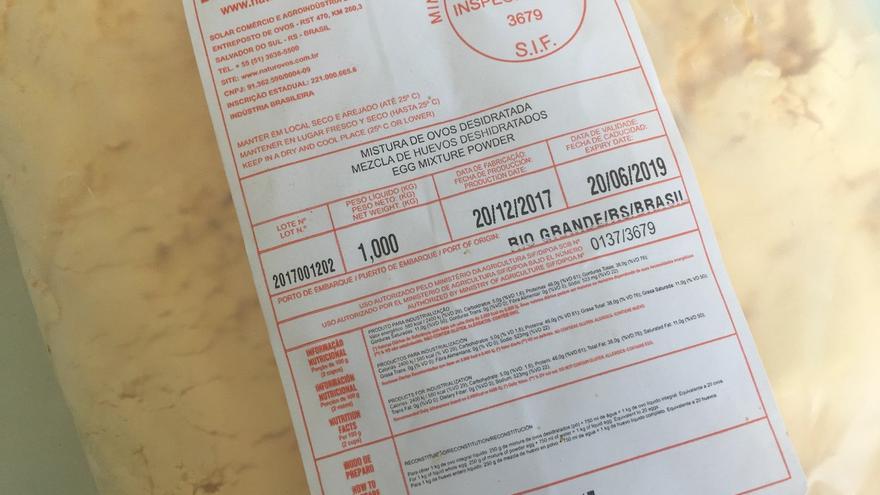
![]() 14ymedio, Marcelo Hernández, Havana, 5 July 2018 — Egg production in Cuba is experiencing difficult times after the damages left by Hurricane Irma and the floods of tropical storm Alberto. The unrationed supply of eggs is way down and several areas of the country and the amounts being delivered to the rationed markets are also down. To provide some relief, the authorities are importing powdered eggs.
14ymedio, Marcelo Hernández, Havana, 5 July 2018 — Egg production in Cuba is experiencing difficult times after the damages left by Hurricane Irma and the floods of tropical storm Alberto. The unrationed supply of eggs is way down and several areas of the country and the amounts being delivered to the rationed markets are also down. To provide some relief, the authorities are importing powdered eggs.
